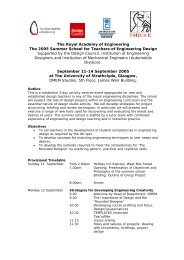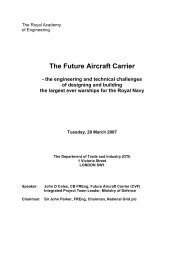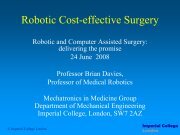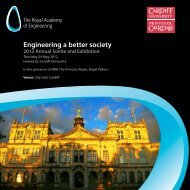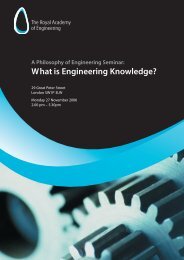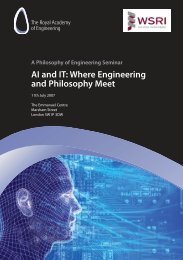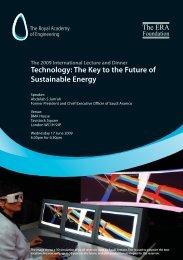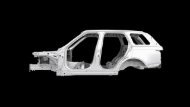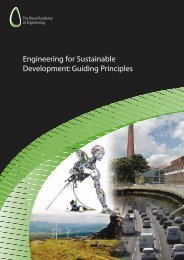Engineering Ethics: Do engineers owe duties to the
Engineering Ethics: Do engineers owe duties to the
Engineering Ethics: Do engineers owe duties to the
Create successful ePaper yourself
Turn your PDF publications into a flip-book with our unique Google optimized e-Paper software.
The Lloyd’s Register Lecture<br />
<strong>the</strong> position of <strong>the</strong> first defendants would, by May 1984, have been alerted <strong>to</strong> any risk of which <strong>the</strong>y were<br />
reasonably unaware at <strong>the</strong> time of handover. There was, in my view, no evidence <strong>to</strong> support such a conclusion.<br />
That being so, I prefer <strong>to</strong> express no opinion on this potentially important legal question."<br />
The case has not yet been foll<strong>owe</strong>d by o<strong>the</strong>rs and <strong>the</strong> development of this particular principle remains<br />
uncertain. Were <strong>the</strong> principle <strong>to</strong> become established, it would have far reaching consequences in terms of<br />
<strong>the</strong> duty of individual Engineers who might succeed those in <strong>the</strong> same firm or company who were<br />
involved at <strong>the</strong> time of design.<br />
Provisional Conclusion as <strong>to</strong> Public Duties<br />
Having reviewed <strong>the</strong> legal background <strong>to</strong> public <strong>duties</strong>, it may be concluded that while <strong>the</strong> law may<br />
recognise and support ethical action, it affords no support <strong>to</strong> <strong>the</strong> existence of a general duty <strong>owe</strong>d by<br />
individual Engineers <strong>to</strong> <strong>the</strong> public at large. The civil law is concerned solely with <strong>duties</strong> <strong>owe</strong>d by<br />
Engineers <strong>to</strong> individuals or <strong>to</strong> groups or classes whom <strong>the</strong> Engineer ought reasonably <strong>to</strong> contemplate as<br />
likely <strong>to</strong> suffer, particularly in terms of physical injury, as a result of his negligence. Such a duty is<br />
enforceable by <strong>the</strong> person or group suffering relevant loss. The range of persons and <strong>the</strong> circumstances<br />
which <strong>the</strong> Engineer ought reasonably <strong>to</strong> consider as affected by his actions or inactions is wide and may<br />
lead <strong>to</strong> potential liability <strong>to</strong> very large numbers of people. But <strong>the</strong> law affords no support <strong>to</strong> a general duty<br />
enforceable by or at <strong>the</strong> suit of <strong>the</strong> public at large. This is consistent with and reinforced by <strong>the</strong> increasing<br />
range of statu<strong>to</strong>ry <strong>duties</strong>, some placed upon specific persons, in regard <strong>to</strong> matters of health and safety and<br />
<strong>the</strong> environment.<br />
If a general duty <strong>to</strong> uphold <strong>the</strong> public interest, as set out in Institutional rules and codes, is not<br />
enforceable directly as a matter of law, it becomes necessary <strong>to</strong> consider how effect is <strong>to</strong> be given <strong>to</strong> such<br />
rules. The absence of direct enforcement by process of law points firmly <strong>to</strong> <strong>the</strong> Institutions, which publish<br />
<strong>the</strong> codes and rules, as <strong>the</strong> appropriate bodies <strong>to</strong> take action <strong>to</strong> enforce compliance, where necessary. This<br />
may be seen as underpinned by <strong>the</strong> possibility of legal liability falling on <strong>the</strong> Institution itself, as discussed<br />
above. Institutions have <strong>the</strong> p<strong>owe</strong>r, subject <strong>to</strong> <strong>the</strong>ir members, <strong>to</strong> enforce <strong>duties</strong> created by <strong>the</strong>ir Codes of<br />
Conduct, through appropriate sanctions, ultimately amounting <strong>to</strong> depriving those who breach <strong>the</strong> rules of<br />
<strong>the</strong>ir professional membership. Such enforcement procedures are more familiar in o<strong>the</strong>r professions,<br />
particularly medicine. The type of conduct which may be expected <strong>to</strong> lead <strong>to</strong> a medical practitioner being<br />
struck off <strong>the</strong> register and prevented from engaging in practice is established, in broad terms, by<br />
precedent. There is no such body of precedent in <strong>the</strong> UK <strong>Engineering</strong> profession, partly through lack of<br />
any body of reported disciplinary proceedings and also, partly, because <strong>the</strong>re are few areas in <strong>Engineering</strong><br />
where professional registration is a requirement of practice. 40 It appears that practices, as regards<br />
enforcement of professional codes, varies between countries. 41 It is important that <strong>the</strong> question of<br />
enforcement by <strong>the</strong> UK Institutions, if it is <strong>to</strong> be enlarged, should be approached in a systematic manner,<br />
avoiding <strong>the</strong> tendency of fragmentation between different Institutions. Lessons should also be learned<br />
from experience abroad. The support of both members of <strong>the</strong> profession and <strong>the</strong> public will be vital <strong>to</strong> <strong>the</strong><br />
establishment of a credible and respected procedure.<br />
Having now reviewed <strong>the</strong> issue of public <strong>duties</strong> and enforcement, it is appropriate <strong>to</strong> turn <strong>to</strong> what might<br />
be regarded as <strong>the</strong> converse issue, namely direct action taken by individual Engineers in response <strong>to</strong><br />
ethical issues. Indeed, this might be regarded as <strong>the</strong> more appropriate starting point for any discussion on<br />
<strong>Engineering</strong> ethics. This <strong>to</strong>pic concerns primarily actions in response <strong>to</strong> what is perceived <strong>to</strong> be an<br />
impending but preventable disaster. As will be seen, <strong>the</strong> <strong>Engineering</strong> professions in many countries have<br />
an honourable tradition of direct action where an individual considers that a preventable situation will<br />
endanger public safety or o<strong>the</strong>rwise prejudice <strong>the</strong> public interest. Such actions can breach <strong>the</strong> Engineer’s<br />
terms of employment and result in serious economic harm. Many different ethical as well as practical<br />
issues flow from such actions.<br />
40 See, e.g., Reservoirs Act 1975 s.4, repeating provisions in <strong>the</strong> former Reservoirs (Safety Provisions) Act 1930.<br />
41 The Institution of Engineers, Australia, is reported <strong>to</strong> receive over 150 complaints each year, from fellow members as well<br />
as <strong>the</strong> public, which are pursued in accordance with detailed disciplinary regulations, including an initial filtering system<br />
and an appeals procedure. The accused member is often legally represented and results of <strong>the</strong> proceedings are publicised,<br />
in similar manner <strong>to</strong> medical disciplinary proceedings.<br />
12 The Royal Academy of <strong>Engineering</strong>






